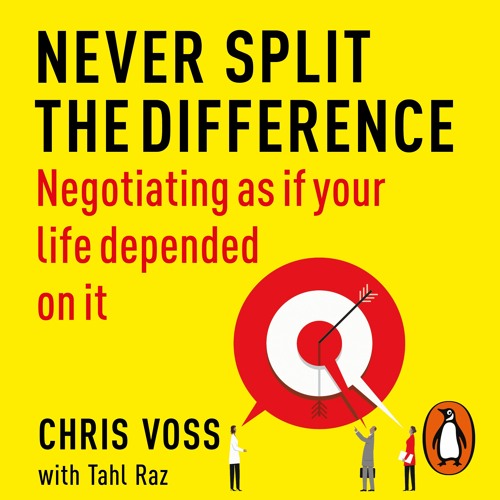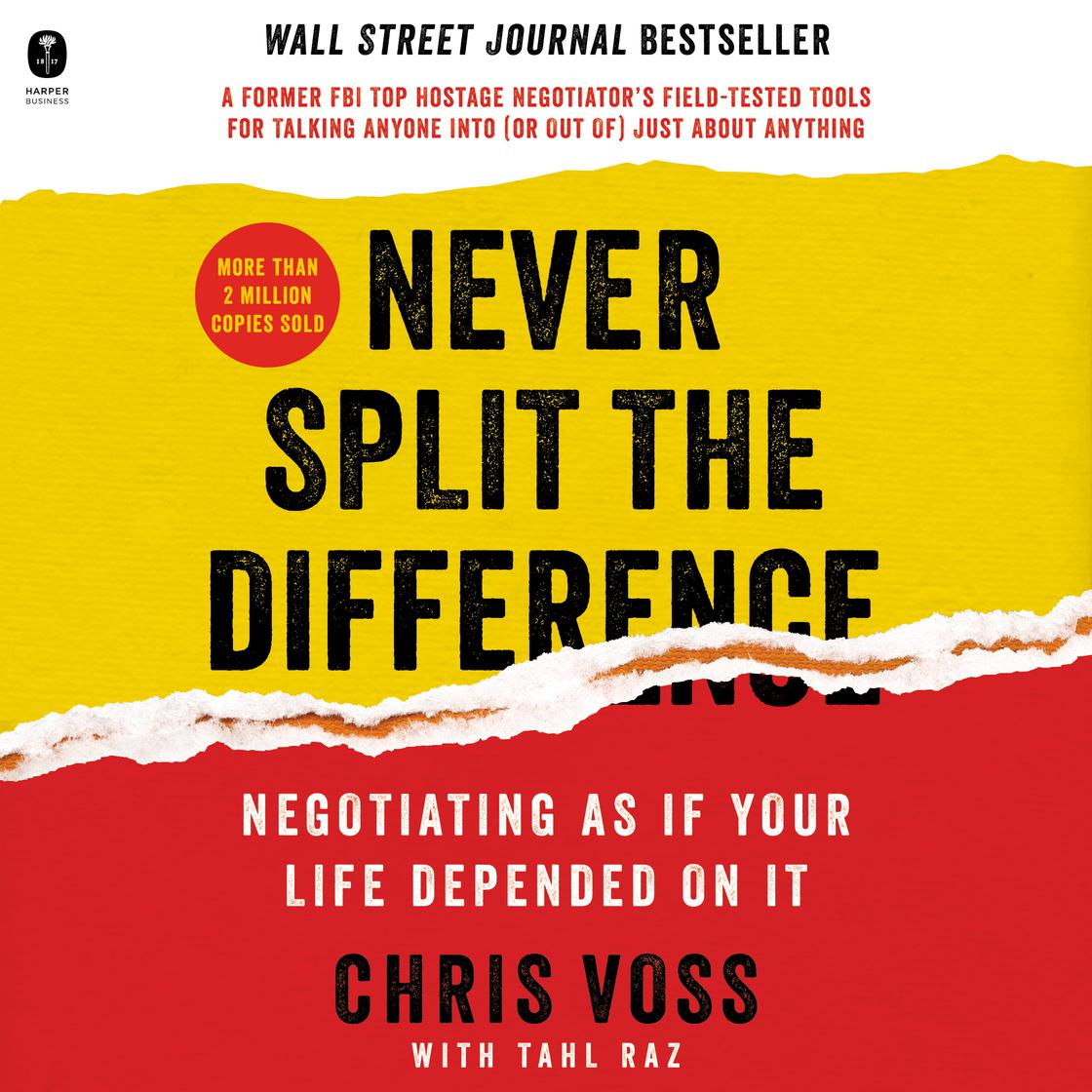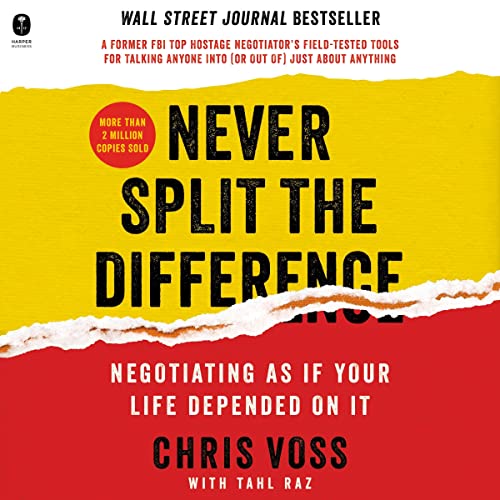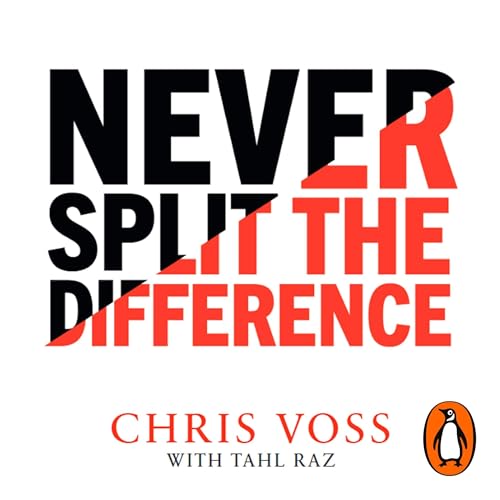“Never Split the Difference” by Chris Voss and Tahl Raz teaches negotiation strategies from an FBI hostage negotiator’s perspective. The audiobook offers practical techniques for everyday situations.
Chris Voss, a former FBI negotiator, shares his expertise in negotiation. His techniques are both practical and effective. “Never Split the Difference” provides listeners with real-world advice on how to handle various negotiation scenarios. The audiobook breaks down complex concepts into easy-to-understand strategies.
Each chapter builds on the previous one, making the learning process seamless. Voss’s experience adds credibility and depth to the content. Tahl Raz’s collaboration ensures the book is engaging and informative. This audiobook is essential for anyone looking to improve their negotiation skills. It’s a valuable resource for both personal and professional growth.

Key Negotiation Strategies From ‘never Split The Difference’
Chris Voss and Tahl Raz’s audiobook, ‘Never Split the Difference’, offers powerful negotiation techniques. These strategies can transform your approach to negotiations. Let’s delve into some key strategies.
The Power Of ‘no’
Saying ‘No’ can be a powerful tool in negotiations. It helps you maintain control. It also gives you time to think. Instead of saying ‘Yes’ quickly, consider the impact of ‘No’. It can help you gain valuable information. It also puts the other party on the defensive.
Tactical Empathy: Understanding Emotions
Tactical empathy involves understanding the emotions behind words. It helps you connect with the other party. When you show empathy, you build trust. This trust can lead to better outcomes. Try to listen actively. Pay attention to tone and body language. Reflect back what you hear. This shows you understand their feelings.
The Accusation Audit: Disarming Fear
The Accusation Audit helps disarm the other party’s fears. Acknowledge their concerns before they voice them. This can surprise and disarm them. Make a list of possible accusations. Address them head-on. This shows honesty and builds trust. It also helps to clear the air and move forward.
Mirroring And Labeling: Tools For Better Communication
In the audiobook Never Split the Difference by Chris Voss and Tahl Raz, two powerful techniques are highlighted for effective communication. These techniques are mirroring and labeling. They help in understanding and connecting with others better. Let’s dive into these tools.
Mirroring: The Simple Technique
Mirroring is a simple yet powerful tool. It involves repeating the last few words the other person said. This shows that you are actively listening. It encourages them to share more information.
For instance, if someone says, “I am feeling stressed about work,” you can respond with, “Stressed about work?” This keeps the conversation going and makes the other person feel heard.
Here are some benefits of mirroring:
- Builds rapport and trust
- Encourages the other person to elaborate
- Shows active listening skills
Labeling Emotions: Navigating Conversations
Labeling emotions involves identifying and naming the feelings of the other person. It helps in navigating conversations smoothly. By labeling emotions, you acknowledge the other person’s feelings. This creates a sense of understanding and empathy.
For example, if someone says, “I am really frustrated with this project,” you can respond with, “It sounds like you are feeling frustrated.” This shows that you understand their emotions and are empathetic.
Benefits of labeling emotions include:
- Creates a sense of empathy
- Helps in de-escalating conflicts
- Improves communication and understanding
Using mirroring and labeling can transform your communication skills. They are easy to use and highly effective. Try them in your next conversation and see the difference.
Applying Lessons From The Audiobook In Real Life
Chris Voss and Tahl Raz’s audiobook, Never Split the Difference, offers powerful negotiation tactics. These tactics can transform everyday interactions. From job negotiations to resolving conflicts, their techniques prove invaluable. Let’s explore how you can apply these lessons in real life.
Negotiating Salary: Practical Tips
Negotiating your salary can be daunting. But with the right approach, you can achieve your desired outcome. Here are some practical tips:
- Prepare thoroughly: Know your worth and industry standards.
- Use mirroring: Repeat the last three words your employer says. This builds rapport.
- Label emotions: Identify and verbalize your employer’s emotions. This shows empathy.
- Be ready to walk away: Show that you have other options.
Conflict Resolution In Personal Relationships
Resolving conflicts with loved ones can be tricky. Here’s how you can use negotiation skills:
- Listen actively: Show that you understand their point of view.
- Ask calibrated questions: Use open-ended questions to gather more information.
- Label emotions: Identify and state their feelings. This helps in understanding.
- Offer a solution: Propose a win-win outcome.
Negotiation In Sales: Closing Deals
Closing deals is crucial in sales. Applying Voss’s techniques can help seal the deal:
| Technique | Application |
|---|---|
| Mirroring | Repeat phrases to build rapport and trust. |
| Labeling | Identify and state the client’s emotions. This shows you understand them. |
| Accusation Audit | Address potential objections before the client raises them. |
| Calibrated Questions | Ask open-ended questions to guide the conversation. |
By using these techniques, you can close deals more effectively.


Conclusion
“Never Split the Difference” audiobook by Chris Voss and Tahl Raz offers invaluable negotiation insights. Applying these strategies can transform your approach in business and life. Gain confidence and mastery in negotiations. This audiobook is a must-listen for anyone seeking to improve their negotiation skills.



